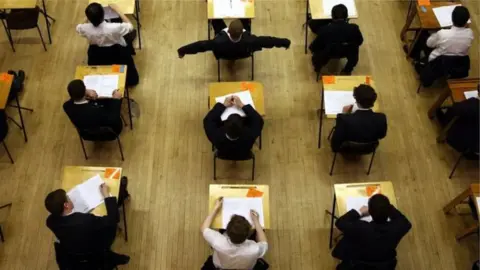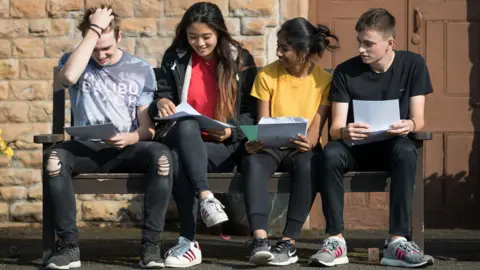Coronavirus: 'No change' to stance on awarding exam grades, CCEA says
 PA Media
PA MediaThe Northern Ireland exams board has said there has been "no change" in its approach to awarding exam grades.
The Council for the Curriculum, Examinations and Assessment (CCEA) said it would ensure that GCSE, A and AS level standards were maintained.
But it said schools could use results from mock exams to appeal if they feel a pupil's grade is wrong.
In England, however, pupils have been told their exam grades will be no lower than their mocks results.
In Scotland results predicted by teachers alone will now be used to give pupils their grades.
That is after a major U-turn by the Scottish government on Tuesday, which abandoned a moderation system for grades by the Scottish Qualifications Authority (SQA).
In Northern Ireland, as exams were cancelled, grades will be awarded following a three stage process:
- Teachers predicted grades for pupils based on things like homework, coursework and previous exam results
- Schools then ranked their pupils in each subject
- That data then went to CCEA, which moderated it using a range of evidence including the previous performance of schools and pupils.
In a statement made on Tuesday night after the change in Scotland, CCEA said grades in Northern Ireland would still be awarded "based on a combination of teacher professional judgement and statistical modelling, as directed by the Minister of Education".
"A key element of the process is to ensure that qualifications standards are maintained this year," the body said.
"There has been no change in this direction or our approach."

Analysis: 'Tested like never before'
The Scottish government's decision to scrap its own exam board's role in awarding pupils grades this year was astonishing.
That was followed by UK Education Secretary Gavin Williamson's last-minute decision to tell pupils that results from their mock exams could replace their A-Level grades.
But in Northern Ireland the CCEA is holding firm.
It says the model it has put in place after receiving estimated grades for pupils from teachers and schools is fair and robust.
Results would have risen sharply this year had that 'standardisation' not taken place.
Some grades provided by schools will be changed though, and those will be carefully scrutinised.
In the absence of exams this year, it is CCEA which is being tested like never before.

CCEA chief executive Justin Edwards has previously said top grades at A-level would have risen in 2020 by at least 10% if data from schools alone had been used and not standardised by CCEA.
However, Mr Edwards said it would allow schools to use mock exam results and some completed units of GCSEs in appeals if it felt a pupil had been given the wrong grade.
 PA
PA"This year, due to the alternative arrangements, it is not possible to ask for examination papers to be reviewed as would be normal," he said.
"We recognise that there is robust evidence available on student prior performance and that this could be considered within the appeals process.
"The opportunity for schools and colleges to submit mock examination information and completed GCSE units provides a broader scope of evidence for appeal."
CCEA's decision on appeals was welcomed by the Education Minister Peter Weir.
"I hope that these steps will provide reassurance to those students who are awaiting their examination results and I want to thank CCEA for all their work on this issue.," he said.
CCEA has previously said it would scrap fees for appeals against results this year.
However, appeals will only be accepted from schools and colleges and not directly from pupils.
Though pupils will be able to ask their school to appeal on their behalf if they think CCEA has made an error in the process of awarding them their grade, they cannot appeal just because they are unhappy with the grade their teacher or school predicted for them.
